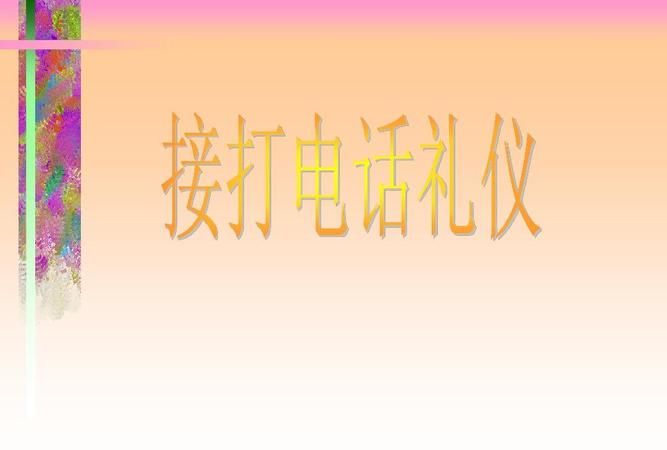本文目录
美国见面礼仪英语介绍
电话礼仪英语介绍
导语:静音键可以起到惊人的作用,但是你要确定自己知道怎么使用它。电话礼仪很重要。以下我为大家介绍电话礼仪英语介绍文章,欢迎大家阅读参考!

When you have a conference call rather it is from business to business, or business to an employee at home or abroad conducting business, it is important that the conference calling experience is productive and smooth sailing. No matter what role you play in the conference call, it is necessary that you maintain the proper etiquette for conference calls.
当你在参与一个电话会议的时候,不管是公务之间的往来,还是在家的时候收到了单位的任务,又或者是海外业务的推进,老道的会议经验都对工作的顺利推进和提高效率起到了重要的作用。无论你在电话会议中扮演什么角色,掌握恰当的会议礼仪都是十分必要的。
1.Quiet is the key
1、安静的环境是会议的关键
Make sure, when you are on the conference call that you are in a very quiet room, away from any disturbances. This will make sure that you hear everything that is going on and keep themisunderstandings to a minimum. It is impossible to keep the misunderstandings at bay if you have a dog barking, machines running, or people talking in the background.
当你参与进电话会议中时,确保你是在一个远离任何干扰,非常安静的房间里。这将保证你能听到会议的全部内容,并且使得误解减少到最低限度。如果你周围环境里有狗的叫声,机械运转的噪音,又或是其他人在说话的话,那是不可能保证正确理解会议内容的。
2.The Telephone Equipment
2、电话设备
Make sure that you are using a phone that will minimize the noise in the background. Some telephone and most all cell phones will pick up even the slightest noise or interference, which will not only cause troubles for you hearing the speakers, but others as well.
确保你使用的电话可以将周围噪音干扰降到最小。一些电话机和大部分手机会把非常微弱的'噪音干扰都收录进去,这不仅会影响到你自己收听发言人的声音,也会对别人造成麻烦。
3.Using Telephone Technology
3、使用电话技术
The mute button does wonders, but make sure you know how to use it. The mute button should be used if there is a lot of background noise that you simply cannot control or if someone is particularlytalkative. Of course, make sure you know how to un-mute for when it is your turn to speak or answer a question.
静音键可以起到惊人的作用,但是你要确定自己知道怎么使用它。当你周围有一些噪音你没有办法轻易控制,或者其他人正在畅谈的时候,你最好开启静音键。当然,当轮到你发言或回答问题时,你要知道怎么解除静音。
4.Time
4、时间
Make sure you set the conference call up in advance and let everyone know all information such as pass code or phone number. It is also necessary that you take time zones in to consideration if you have people across several time zones to include on the conference call.
尽量做到提前为会议做好准备,让每一个参与会议的人知道诸如密码或电话号码等所有信息。如果会议参与人员在好几个不同时区里,你同样有必要考虑好电话会议的进行时间。
5.Being on Time
5、做到准时
If you are the conference call leader, you want to start right on time. Do not wait for others if they are late. People on the call want to start right away, because there may be other business they need to attend to. If you are simply in the call, be on time, you do not want to miss anything that might be important.
如果你是电话会议的负责人,你会希望会议按时开始。如果有人迟到了,不要等他们到了之后再开始。与会人员想要立即开始会议,因为他们在此之后也许还需要参与其他的事物中。如果你是普通的会议人员,要做到准时,你不会想要错过任何可能重要的信息。
6.Introductions
6、自我介绍
Make sure that every person on the call introduces himself or herself. This will allow for building relationships and getting people to open up and feel comfortable.
让每一个与会人员介绍他们自己。这将有利于大家构建人际关系,还可以让大家更放得开,感觉比较自然。
7.Clarification
7、说明
Not everyone will be able to tell who is who by the voice. Make sure before anyone speaks that his or her name is said first. For example, this is Bob, could you repeat that company name again.
不是每个人都能通过声音分辨出谁是谁。所有人尽量在说话前首先把自己的名字报出来。例如,我是Bob,能请您再重复一次那家公司的名字吗?
8.Eating
8、吃东西
Never eat w hile you are on a conference call, who wants to hear chewing in their ear? If you must get a drink of water, put the call on mute so no one will have to hear the emitted sounds. This includes chewing gum.
绝对不要在电话会议时吃东西,谁会愿意听见咀嚼的声音?如果你实在需要喝口水的话,就把电话调成静音,这样就不会有人听见你发出的声音了。口香糖也包括在内。
9.Keep on Topic
9、不要跑题
Do not fill the call with unnecessary talk. Keep to the point, because remember there may be several people on the call that have other pressing things to do.
不要让电话会议里都是废话。抓住重点,因为要记住可能有一些正在参与会议的人还有其他紧急的事物要处理。
打电话礼仪英语用语
一、不太会讲英语的要怎么说:
(1) 请稍待片刻。 Just a moment, please.
(3) 请等一下。我找个人来听。 Hold on, please. I'll get someone to thephone.
(2) 请别挂断。我找一位会说英语的人来。
Hold the line, please. I'll get an English speaker.
(4) 很抱歉,我英语说得不好。我找位会讲英语的人稍后回电话给你。请教您的大名 及电话号码?
I'm sorry, I don't speak English well. I'll have an Englishspeaker call you back later. May I have your name and telephonenumber?
二、接电话的开场白
(1) 早安。这里是正泰贸易公司。我能效劳吗?
Good morning. This is Chengtai Trading Company. May I helpyou?
(2) 喂。海外营业部。我是王大明。
Hello. Overseas Sales Department. Taming Wang speaking.
(3) 先锋电子。我是吴玛莉。
Pioneer Electronics. This is Mary Wu speaking.
(4) 午安。这里是大安商业银行。我能为您效劳吗?
Good afternoon. This is Dan An Commercial Bank. What can I dofor you?
(5) 喂。这里是王公馆。
Hello. This is the Wang residence.
(6) 午安。我是王大明。
Good afternoon. Taming Wang speaking.
(7) 我是杨文凯,请讲。
Wenkai Yang. Speaking
三、不明了对方所言时
(1) 能说得明确一点吗?
Could you put that in more specific terms?
(2) 很抱歉。我没听懂你的话。
I'm sorry. I couldn't follow you.
(3) 我无法确定你的意思。
I'm not sure what you mean.
(4) 你讲得太快了。我跟不上。
You're talking too fast. I can't keep up.
(5) 你能说得简单一点吗?
Could you put that more simply?
(6) 请你再多解释一下好吗?
Will you explain a little bit more?
四、通话将毕时的结尾语
(1) 谢谢你来电。 Thank you for calling.
(2) 很高兴跟你谈话。 Nice talking to you.
(3) 感谢你打给我。 It was kind of you to call me.
(4) 请随时再打电话给我。 Call me again any time.
(5) 我该挂电话了。 I'd better get off the phone.
(6) 让我们尽快聚聚。 Let's get together soon.
(7) 有空请再打电话来。 Call again when you've got time.
职场会议礼仪英语
职场英语:办公室的八个实用职场礼仪技巧
The modern workplace is full of potential pitfalls, meaning you have to be on your toes to make, and maintain, the right impression with your co-workers and colleagues.
现代职场充满了潜在的陷阱,这意味着你必须小心去创造并维护在同事之间的良好印象。
It's not just for the sake of politeness —more than three-quarters of HR managers recently polled by Robert Half said technology etiquette breaches can affect a person's career prospects.
这不仅仅是为了礼貌。在罗伯特·哈夫公司最近的一次调查中,超过四分之三的人力资源经理说违反技术礼仪可以影响一个人的职业前景。
We've taken a look at tech etiquette in a contemporary company setting for some useful advice offering up-to-date "do's and don'ts" for the digital age.
我们看了现代化企业的技术礼仪,他们能提出一些有用的建议,为数字化时代提供最新的“行为守则”。
Have a read through our guidelines below. In the comments, share your tips for staying on the right side of polite in the workplace —and do share any bad manners horror stories you've experienced.
阅读如下指导方针。在评论中,分享你在工作中保持正确礼仪的方法,以及你经历过的不礼貌的事。
1. Never Unplug a Device on Charge
1. 不要拔掉在充电的设备
It may sometimes be a scramble to find a socket to juice up your dying gadgetry, but the "first come, first served" rule stands fast in this area. You must never unplug another device that's on charge without first checking that it's okay to do so.
有时候,你很难找到插座给自己快要没电的设备充电,但是“先到先得”的规矩在办公室是一直存在的。在确认是否可以这么做之前,永远不要把别人正在充电的设备拔掉。
Always, always, always ask —and if you can't find device's owner, then walk away and find another outlet. For all you know, the gadget's owner might be about to head into a vitally important meeting or call and need all the juice they can get.
一定记得要先询问。如果你找不到设备的主人,就放弃它去找其他的插座吧。要知道,这些设备的主人可能要参加一个至关重要的会议或者接听重要电话,他们需要设备保持充足的电量。
2. Don't Wear Headphones Away From Your Desk
2. 离开座位时不要戴耳机
Does your company allows its employees to work with headphones on? Plugging into music can be a great way to concentrate and block out the noise and distractions of a busy work environment, but be sure to take them off every time you leave your seat. Even if you want to try and maintain your level of concentration, don't be tempted to wear headphones in communal areas, it can be perceived as anti-social, and downright rude.
你的公司允许员工戴耳机工作吗?戴耳机听音乐可以很好地集中精力,阻挡忙碌的工作环境带来的噪音和干扰,但确保你离开座位的时候摘下耳机。即使你想要保持精力高度集中,也不要尝试在公共场所戴耳机,这会被认为是反社会的行为,并且非常粗鲁。
3. Don't Use Someone Else's Computer
3. 不要用别人的电脑
It's easy to think all equipment is company property and fair game for use, but this does not extend to computers and laptops. You should never use someone else's PC, even if it is just for a super-quick fact check. Most people are pretty possessive about their PCs and view unauthorized use as an intrusion of their privacy.
在办公室人们很容易认为所有的设备都是公司财产,每个人都能使用,但这并不包括电脑和笔记本电脑。永远都不要用别人的电脑,即使你只是百度一下。许多人都想独自占有自己的电脑,并且认为未经允许而使用自己的电脑是一种侵犯个人隐私的行为。
4. Don't Forget to Refill Supplies
4. 别忘了补充物资
Be a good neighbor when it comes to office equipment. If you use the last of the photocopier paper, refill it. Return gadgets fully charged. Put a new pot of coffee on if you have the last cup. Report inevitable printer errors to someone who can fix the issue. Don't walk away from an issue, even if you're mega-busy and think no one noticed that you were the last person to use it.
当涉及到办公设备时,要当一个好邻居。如果你把剩下的复印纸用完了,记得补充。用完设备之后记得把电充满。如果你喝完了最后一杯咖啡,记得准备一壶新的。打印机出了问题,记得给维修工报修。别把问题放着不管,即使你真的很忙,以为没人会注意到你是最后一个使用者。
5. Put Your Phone on Silent at All Times
5. 时刻把手机调成静音
Even if it's office policy to allow personal calls on your mobile phone, we strongly suggest switching your phone to silent every single time you enter the office. You may only get personal calls on occasion, but you can bet the times you do either someone important will be walking past or you'll have left your phone unattended at your desk while everyone else hears it ring. Also, your novelty alert tones might amuse you, but can seriously grate on the nerves of nearby colleagues. Don't be that person.
即使公司政策允许你接打个人电话,我们也强烈建议你每次进办公室时把手机调成静音状态。你可能只是偶尔接打个人电话,但是你可以设想,万一正好有重要的人经过,或者你把手机留在桌子上不管,周围的人都听到了铃声响。而且,你的新奇警报铃声可能会逗你开心,但它也严重刺激到你周围同事的神经。别当这种人。
6. Limit Laptop Activity in Meetings
6. 在会议中少使用笔记本电脑
While it's commonplace to take your laptop into meetings, try and be disciplined about what you do with it. Although it's tempting to carry on working, check mail, IM or even browse during meetings, you should limit this kind of activity out of politeness. If no one can see your screen, you may think that tapping away on the keyboard could be interpreted as taking notes, but it will be fairly obvious to anyone else present that your attention is away from the room.
虽然把个人的笔记本电脑带入会议室是很普遍的,但要注意克制自己对它的使用目的。虽然带着电脑可以很容易地在会议期间继续工作,查阅邮件、信息甚至是浏览网页,但出于礼貌,你应该限制自己的这些行为。如果没人能看到你的屏幕,可能你以为在别人看来你在键盘上敲打是在记笔记。但对在场的其他人来说,其实很明显能感觉到你的注意力已经不在这里了。
7. Don't Be an IM Nuisance
7. 别被即时通讯所拖累
Instant messaging is a really useful tool, but it's easy to misuse and this can be a real source of annoyance. We'd hope it goes without saying to respect someone's "busy" status, but there are other issues to consider too. Only inter-office IM someone with a query that can be resolved within a few brief responses. If the conversation is going to be longer than that, get up and speak to them in person or pick up the phone.
即时通讯是一个很有用的工具,但它很容易被误用,这可能是烦恼的真正来源。我们希望“忙碌”状态时不被打扰,但也有其他的问题需要考虑。只有当使用办公室内部的即时通讯,而且问题可以通过几个简短的回答解决时才可行。如果谈话越来越长,就当面说或者打电话吧。
8. Don't Be a Screen Smearer
8. 别当屏幕涂抹者
Finally, this may seem like a small thing to pick up on, but we promise you it's a huge source of annoyance for many. Don't be a screen smearer. We're obviously not talking about touch screens here, but monitors and laptop displays. Some people really dislike it when you put fingerprints on their screens. While it's easy to do if you're trying to make a point or explain something, try not to touch other people's screens and definitely don't touch any screen if you've got dirty fingers.
最后,这看起来是一件小事,但是我们保证它会给很多人带来诸多烦恼。别当屏幕涂抹者。我们这里显然不是在谈论触摸屏,而是显示器和笔记本电脑这样的屏幕。有些人真的很不喜欢别人把指纹印在他们的屏幕上。当你想表达观点或解释事情时很容易这么做,但是尽量不要用手去摸别人的屏幕。如果你的手不干净,更是不要触碰任何屏幕。
见面礼仪英语对话
Emily: Hi, Ryan! How was your morning?
嗨,Ryan! 今天早上过得好吗?
Ryan: So so. (Drinking coffee…)
一般了。(喝着咖啡...)
Emily: You look tired. What time did you get up?
你看起来有点累。你几点起床的呢?
Ryan: En…I got up at 11:30AM. I eat breunch now.
嗯...我11:30才起来,现在早餐午餐一起吃。
Emily: Oh, so late. What time did you go to bed last night?
噢,这么晚。你昨晚几点才睡啊?
Ryan: 2:00AM.
凌晨2:00
Emily: Oh,so late. What did you do?
噢,太晚了。你做什么那么才睡?
Ryan: I played computer games. I have been so absorbed in it that I forgot the time. I’m always crazy about playing the game. It’s a pain in the neck to cut down playing the game.
我玩电脑游戏。我玩得太专心都忘记时间了。我总是痴迷于游戏,对于我来说戒掉它太痛苦了。
Emily: Maybe you should find some important things to do to instead it. If you were busy in other things, you would have no time to play it.
也许你应该找一些有意义的事做从而代替它。如果你有其它事情忙着,你就没有时间玩游戏了。
Ryan: En…Good idea! I will try it from tomorrow. Thank you very much!Really nice speaking to you!
嗯,好主意!我将从明天开始试一试。非常感谢!和你讲话真开心。
Emily: You too! See you later.
跟你讲话我也很开心!再见了。
Ryan: See you.
再见。
;英语礼貌用语情景对话
下面是我整理的 电话英语 礼貌用语,欢迎大家阅读!
1. I won't keep you any longer。
我不耽误你时间了。
2. Sorry, it's getting late. Can you call again tomorrow morning?
抱歉,时候不早了。你可不可以明天早上再打来?
3. Sorry, I've got to hang up. My wife's waiting for me。
抱歉,我得挂电话了。我老婆在等我。
4. I think I'd better let you go. I'll talk to you later。
我想我应该让你去忙了,我晚点再打给你。
5. I have to get back to work. I'll call you later tonight。
我要回去工作了。我今晚再打给你。
6. Shall we continue this later? I've got a call waiting。
我们可不可以晚一点再继续谈?我有插播。
7. It's kind of late. Why don't we talk about it tomorrow?
有点晚了。我们何不明天再谈呢?
8. I've got to meet a client right now. Can we talk later?
我现在要去见一个客户。我们可以晚一点再谈吗?
9. I've really got to go, I'll get back to you when I get the office。
我真的得走了,我进办公室再打给你。
10. Sorry, I must end the conversation. There's someone on the other line。
抱歉,我不能再说了。有另一人在线。

英语打、接电话有什么注意的礼仪吗

英语接电话要注意的礼仪
基础会话
1. leaving a Message (留话)
学习重点:找某人听电话
表示某人不在
表示要留话
留下自己的联络处
询问如何拼对方的姓名
会话1
留下联络处
A:This is Deng—Robert Deng from Taiwan. I‘d like to speak with your Director.
我姓邓,台湾的Robert邓。请您们主任听电话。
B:Mr. Jones is not in right now. May I take a message?
Jones 先生现在不在,您要不要留话?
A:Yes. Could you ask him to call me at the Hilton Hotel, Room No. 579?
好,请转告他打电话到希尔顿店,579号房来找我,好吗?
B:Certainly, Mr. Deng. Hilton Hotel, Room 579?
没问题,邓先生,希尔顿579号房吗?
A:That’s right. Thank you.
没错,谢谢您。
词语
1.This is……我是……。在电话中说明“我是谁”时,是用“This is……”,而不是“I am”。
2.I‘d like to……等于“I would like to……”——“我想……”。“would like”为“want”的客气用法。
3.speak with …… 找……听电话;与……讲话
4.in 在(家、办公室)中。此处的“in”不是介系词,而是副词。
5.right now 现在。“right”为副词,意思是“正是”,为强调的用法。
6.take a message (帮人)留话。“take”是“记下;记录”,“message”是“口信;传话”。
7.No n. “No”是“number”的缩写,通常放在数目字的前面,表示“第……号”,如“No. 3”,即是“第三号”。
8. certainly adv. 当然可以;好(口语用法)
关键句型
CALLER:请转告他打到……找我
Could you ask him to call me at……?
这句型适用于找不到对方,或对方有事不能前来接听时,留下自己的联络处,请其回电。
“at”之后可接地点或电话号码。“could”是请求或征询时的助动词,用于请求、委托时,语气谦和客气。
同义句
Would you tell him to call me at……?
Could you inform* him that I can be reached* at……?
Would you have him get back to me* at……?
inform v. 通知
reach v. 能联络得到
get back to (someone) 回(某人)电话
RECEIVER:他不在,您要留话吗?
I take a message?
这句话适用于“某人”只是暂时不在,而仍会回来之时。请对方留话即表示自己将告知“某人”,请其主动联络,而不必劳烦对方再打来。“may”是用于请求或征询时的助动词,也可用“can”代替,不过“may”在语气上较为客气。
同义句
Mr. Jones is out* at the moment*. Would you like to leave a message?
Mr. Jones is not available* right now. May I give him a message for you?
Mr. Jones is away from his desk*. Can I take a message?
out adv. 外出;不在
at the moment 现在;此刻
available a.是指“找得到人;在此处”的意思
away from one’s desk不在位子上
第一次见面打招呼礼貌用语英语
电话礼貌英语用语
电话礼仪或许你懂一点,但是现在如果你和外国人打交道那你懂得英语的电话礼仪吗?下面是我为大家整理的英文接电话礼仪,希望能够帮到大家哦!

英文接电话礼仪
基础会话
1. leaving a Message (留话)
学习重点:找某人听电话
表示某人不在
表示要留话
留下自己的联络处
询问如何拼对方的姓名
会话1
留下联络处
A:This is Deng—Robert Deng from Taiwan. I‘d like to speak with your Director.
我姓邓,台湾的Robert邓。请您们主任听电话。
B:Mr. Jones is not in right now. May I take a message?
Jones 先生现在不在,您要不要留话?
A:Yes. Could you ask him to call me at the Hilton Hotel, Room No. 579?
好,请转告他打电话到希尔顿店,579号房来找我,好吗?
B:Certainly, Mr. Deng. Hilton Hotel, Room 579?
没问题,邓先生,希尔顿579号房吗?
A:That’s right. Thank you.
没错,谢谢您。
词语
1.This is……我是……。在电话中说明“我是谁”时,是用“This is……”,而不是“I am”。
2.I‘d like to……等于“I would like to……”——“我想……”。“would like”为“want”的客气用法。
3.speak with …… 找……听电话;与……讲话
4.in 在(家、办公室)中。此处的“in”不是介系词,而是副词。
5.right now 现在。“right”为副词,意思是“正是”,为强调的用法。
6.take a message (帮人)留话。“take”是“记下;记录”,“message”是“口信;传话”。
7.No n. “No”是“number”的缩写,通常放在数目字的前面,表示“第……号”,如“No. 3”,即是“第三号”。
8. certainly adv. 当然可以;好(口语用法)
关键句型
CALLER:请转告他打到……找我
Could you ask him to call me at……?
这句型适用于找不到对方,或对方有事不能前来接听时,留下自己的联络处,请其回电。
“at”之后可接地点或电话号码。“could”是请求或征询时的助动词,用于请求、委托时,语气谦和客气。
同义句
Would you tell him to call me at……?
Could you inform* him that I can be reached* at……?
Would you have him get back to me* at……?
inform v. 通知
reach v. 能联络得到
get back to (someone) 回(某人)电话
RECEIVER:他不在,您要留话吗?
I take a message?
这句话适用于“某人”只是暂时不在,而仍会回来之时。请对方留话即表示自己将告知“某人”,请其主动联络,而不必劳烦对方再打来。“may”是用于请求或征询时的助动词,也可用“can”代替,不过“may”在语气上较为客气。
同义句
Mr. Jones is out* at the moment*. Would you like to leave a message?
Mr. Jones is not available* right now. May I give him a message for you?
Mr. Jones is away from his desk*. Can I take a message?
out adv. 外出;不在
at the moment 现在;此刻
available a.是指“找得到人;在此处”的意思
away from one’s desk不在位子上
电话礼貌英语用语
1、A Longer Message
2、G:I'm trying to reach Mr.White in Room 3301, but there's no answer.Could I leave a message for him?
3、R:Certainly.The message is for...?
4、G:Bob White in Room 3301.
旅客:3301房间的` Bob White先生。
5、R:3301.Go ahead,please.
接待员:3301,请继续说。
6、G:Please tell Mr.White that the meeting in Beijing tomorrow has been canceled. I'll see him again in Guangzhou next Monday.
旅客:请告诉White先生明天在北京召开的会议取消了,我下星期一在广州与他见面。
7、R:I'm sorry,would you repeat that please?
接待员:对不起请您重复一下好吗?
8、G:Tell Mr.White the meeting in Beijing tomorrow is canceled and I'll see him in Guangzhou next Monday.
旅客:告诉White先生明天在北京召开的会议取消了,我下星期一将在广州与他见面。
9、R:Meeting in Beijing tomorrow is cancelled and you'll see Mr.White in Guangzhou next Monday. Is that right?
接待员:明天在北京召开的会议取消了,您将在下星期一与他在广州见面。是吗?
10、G:That's right.
旅客:是的。
11、R:May I have your name please,sir?
接待员:请告诉我您的名字好吗?
12、G:Bill Thompson.
旅客:比尔。汤姆森。
13、R:Bill Thompson.Thompson?
接待员:比尔。汤姆森 Thompson?
14、G:That's right.
旅客:对。
15、R:Is there anything else?
接待员:您还有别的事吗?
16、G:No,thank you.
旅客:没有了,谢谢。
17、R:I'll give Mr.White the message as soon as he returns.
18、G:Thank you.
旅客:谢谢。
19、R:You're welcome.
接待员:不客气。
20、G:Goodbye.
以上就是关于英语打电话礼仪,美国见面礼仪英语介绍的全部内容,以及英语打电话礼仪 的相关内容,希望能够帮到您。
